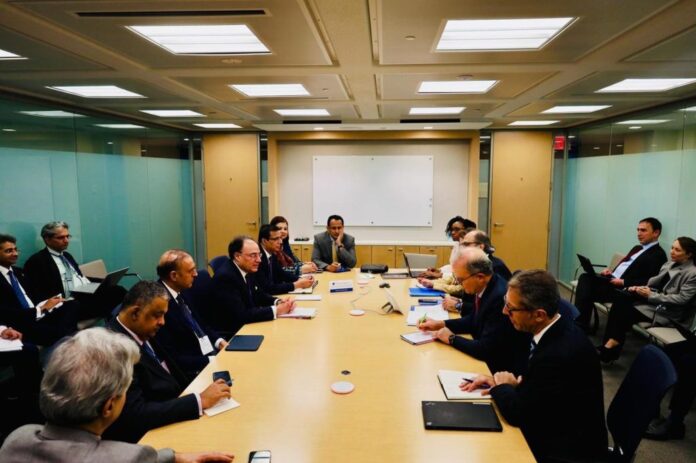WASHINGTON: Federal Minister for Finance and Revenue Senator Muhammad Aurangzeb had a packed first day of his official visit to the United States, engaging in a series of high-level meetings on the sidelines of the Annual Meetings of the International Monetary Fund (IMF) and the World Bank Group (WBG) in Washington.
The minister and his delegation met Jihad Azour, Director of the IMF’s Middle East and Central Asia Department, and his team. Both sides discussed Pakistan’s reform agenda and reaffirmed their commitment to sustaining the current momentum of economic reforms.
The meeting reviewed progress under the Second Review of the Extended Fund Facility (EFF) and underscored the importance of maintaining macroeconomic discipline.
Senator Aurangzeb also attended the Commonwealth Finance Ministers’ Meeting, where he emphasized the need to prioritize concrete actions to build a resilient and prosperous Commonwealth. He voiced support for the operationalization of the Commonwealth Infrastructure and Financial Resilience Hub and the Technical Assistance Fund for peer review and capacity building.
Highlighting the importance of climate financing for developing economies, the minister stressed the need to operationalize mechanisms such as the Loss and Damage Fund.
In another meeting, Senator Aurangzeb held extensive discussions with Axel van Trotsenburg, Senior Managing Director of the World Bank Group. He appreciated the Bank’s continued support for Pakistan’s development agenda and reiterated that the climate crisis remains an existential challenge for the country, citing the devastation from recent floods and their impact on agriculture and GDP growth.
He emphasized the need for greater investment in climate adaptation and mitigation measures and agreed on mobilizing additional resources to manage future natural disasters.
The finance minister was also hosted by the U.S.-Pakistan Business Council (USPBC), where he briefed participants on Pakistan’s improving macroeconomic indicators and stressed that private sector growth was vital to sustaining economic momentum. He reaffirmed the government’s commitment to addressing business challenges and facilitating investment.
Aurangzeb highlighted Pakistan’s recent trade deal with U.S. authorities and expressed optimism about enhancing government-to-government (G2G) and business-to-business (B2B) engagements in key sectors, including mining, agriculture, information technology, and pharmaceuticals.
Earlier, the minister met Robert Kaproth, U.S. Assistant Treasury Secretary for International Finance, and Counselor Jonathan Greenstein. He briefed them on Pakistan’s strong economic fundamentals under the ongoing IMF program and welcomed the successful conclusion of tariff negotiations with the U.S. administration. Aurangzeb also informed them about Pakistan’s new legislation to regulate virtual assets and invited American companies to explore investment opportunities in the oil, gas, minerals, agriculture, and IT sectors.
Continuing his engagements, the minister met Riccardo Puliti, Regional Vice President of the International Finance Corporation (IFC) for the Middle East, Central Asia, Türkiye, Afghanistan, and Pakistan. He appreciated IFC’s role in expanding private sector investment through multi-billion-dollar initiatives under the 10-year Country Partnership Framework (CPF). Both sides agreed to expedite the financial closure of IFC’s flagship Reko Diq project. Aurangzeb also welcomed the establishment of IFC’s new regional office in Islamabad to strengthen collaboration.
In a separate meeting with Dr. Muhammad Sulaiman Al-Jasser, President of the Islamic Development Bank (IsDB), the minister expressed gratitude for the Bank’s continued support and reviewed the portfolio of ongoing IsDB projects in Pakistan. He emphasized the need to accelerate implementation and thanked the Bank for approving financing for two sections of the M-6 motorway.
Both sides agreed to continue cooperation on Pakistan’s polio eradication efforts, the oil financing facility, and the development of a new Country Engagement Framework (CEF).
Senator Aurangzeb also met representatives of Citi Bank, acknowledging its long-standing partnership with Pakistan and appreciating its continued engagement. He shared an overview of Pakistan’s stabilizing macroeconomic outlook, supported by structural reforms and improving credit ratings, and highlighted the country’s growing role as a regional hub for digital innovation and financial services.
During the day, the minister also interacted with U.S. and international media, including interviews with the Associated Press and Reuters. The day concluded with a dinner hosted by Pakistan’s Ambassador to the United States, Rizwan Saeed Sheikh, in honor of the delegation. The event was attended by members of the Pakistani diaspora, community leaders, and U.S. dignitaries, with discussions focusing on Pakistan’s economic reforms and investment prospects.
Senator Aurangzeb lauded the contributions of overseas Pakistanis and reaffirmed the government’s commitment to engaging them in national development efforts.




